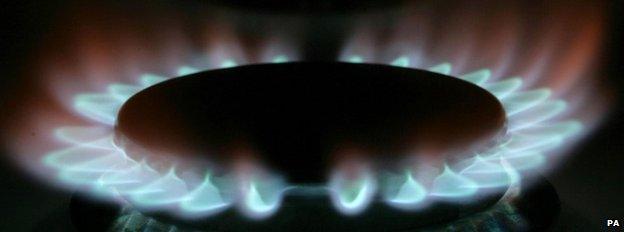Pre-pay meter energy users pay £226 a year more: Citizens Advice
- Published
The energy industry body's advice is to shop around, reports John Moylan
Energy customers on pre-payment meters have been paying an average of £226 a year more than they would have done on the cheapest direct debit tariff, Citizens Advice has said.
The charity said the gap between the cheapest and most expensive tariffs widened by up to a third in six months.
Co-Operative Energy, which had the widest gap of £405, responded by saying it was cutting its pre-payment rates.
It comes ahead of the results of an inquiry into the whole energy industry.
The Competition and Markets Authority (CMA) began its investigation a year ago, and is due to report on Tuesday.
"The CMA investigation provides an opportunity to overhaul the energy industry and make it fairer," said Gillian Guy, the chief executive of Citizens Advice.
"Giving pre-payment meter customers a better deal is a crucial part of this."

Analysis

By John Moylan, BBC industry correspondent
It's not new that those least-able to afford high bills are paying over the odds for energy. But what's striking about this report is both the size of the differential - up to £400 - and the timing of the publication.
It comes just days before the the initial findings from the year-long CMA probe into the energy sector.
That's expected to highlight the plight of millions of customers who either can't or don't switch and come up with remedies to change this.
It could be a landmark moment for the entire industry.
The Citizens Advice report feels like a shot across the CMA's bows - a warning that the energy market has to change to work better for millions of vulnerable customers - not least the increasing number of households that are tied to a pre-payment meter.

'Shop around'
Those who have pre-payments meters are more likely to be on a low income, and 80% of those getting them installed are already in debt. Those who fall behind with payments can be forced to have them, if their supplier obtains a court order.
Users pay for their electricity or gas in advance, by topping up cards or buying tokens.
In the most extreme example, a customer of Co-operative Energy would have had to pay £951 a year if on the cheapest online direct debit deal, but £1,356 if they had a pre-payment meter - a difference of £405 a year.
But having had the contrast pointed out to them by Citizens Advice, the company said they would close some of the gap.
Co-operative Energy told the BBC: "Following contact with Citizens Advice, we have taken the opportunity to review our dual fuel pre-payment tariff and will be reducing it to match the cheapest of the Big Six rates immediately."
It said the tariff had 214 customers and was expensive to manage because accounts were updated manually.
By contrast, British Gas charges pre-payment customers £22 extra.
Responding to the figures, the energy industry said it was committed to delivering fair and competitive tariffs for all customers.
"Suppliers are constantly reviewing their tariffs. We urge customers to shop around for the deal that suits them best," said a spokesperson for Energy UK.
Last month the energy regulator Ofgem found that some pre-payment customers were charged as much as £180 to have meters installed - and up to £160 to have them removed.
It wants energy suppliers to stop the practice by the autumn.